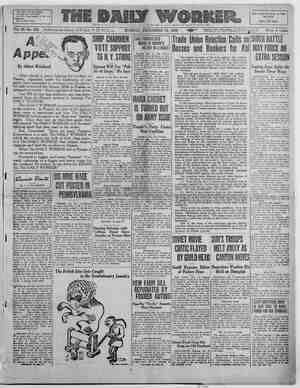Evening Star Newspaper, December 19, 1926, Page 111
You have reached the hourly page view limit. Unlock higher limit to our entire archive!
Subscribers enjoy higher page view limit, downloads, and exclusive features.
THE SUNDAY STAR, WASHINGTON, D. C.—GRAVURE SECTION—DECEMBER 19, A Night With the Poets By W. E. HILL Copyright. 1926, by the Chicaxo Tribune Syndicate 1926. \gvl Mrs. Wohl-Wahl is a great celchrity hunter “My dear,” she is saying to Marian Scollop. whose poem, beginning “Last night, my own, | dreamed that you were cut up in little bits,” was the sensation of the evening, “you must drop in for tea Sunday and read something to a few of my friends. I want you for the 1920 Poetry Anthology I am publishing!™ Mrs. Henry Connubial is acting chairman in place of Mrs. Morris Grosgraine, who, it secms, was asked to the “Follies” this evening and really couldn't decline. “I'm explaining, “but the motion i cannot welcome your objection a‘.fllflifilfi'fl?flZflfflfflfflfflifi’fl'flffl'fi'nfnfn‘n:fl;fl'fl:flm W) Just one of those earnest but ineffectual young men Always getting up to make a motion or object to something in the reading of the minutes, and never heard or allowed to finish Joe and Lorna are column contributors and sce their stuff published, which is something these days They work together. Last week they landed a poem in an evening paper. It ran: “Mary is a little elf She never says, ‘Kid, be yourself. ” Franklin and Leslie, the radicals, are great friends. Their poetry is very similar. All about gold, grinding stecl, smoke and grime, crunching of bones and disorganized labor. In fact, what one doesn’t think of the other does. They are worried over jury duty. “Dou you suppose I did wrong to vote?” asks Franklin. “They say,” opines Leslie, “that teachers are exempt. Now, why couldn't I say I'm teaching you—French, for instance—and then you could say that you are teaching me something—drawing, say Then we'd both be excused.” Oh, those boys are clever!” Cross section of an evening given over to the reading and discussion of current poetry. The gathered 1terati arc becoming very restive. fter all,” the large lady at the right is thinking. “cne can stand just 5o much, be it ever so exquisite!” The young man on the extreme right is asking the tailor-made young lady if she knows any one with influence. “Any one will do, so I can get a hearing!” “Well," replies the tailor-made girl, “I did know a proof reader with Knopf, but she's not speaking to me now!” The poetess of passion, who would bring her matter-of-fact boy triend to a At the end of every reading the young rascal meeting of the Poetry Society. whispers, “So's your old man,” very audibly. The guest of honor at the annual open meeting of the Premeditated Poetry Society (which has no affiliations with the Prenuptial Poetry League) is none other than Leroy J. Rue. editor-in-chiei of “Uncle Ned's Outdoor Page for Boys and Girls” in the Woman's Housel Delight, the magazine of a million homes. Mr. Rue speak briefly on “The Magazine and the Home” the intention of the society to have Queen Marie as gu of honor, but she had a previous engagement, it seems Poets are very sensitive. They hate misunderstood, even in the littlest t hold will 't was 105t to be hings. Here's Lorenzo Belcher, the free-verse boy. going home mad. You know Lor poem “Scar thou my limbs, and strangle me, O epithets.” Well, some fool got up an there were several rhymes in it. Im: When any one knows that Lorenzo did a thing like that in his life. enz " the one beginning, “Bruise Helen: and beat against my tired brain with coarse d said agine ! never Corinna Coronna Crabfoot, the 13- year-old wonder, has kindly consented to read a few choice morsels from her published poems. (Autographed copies on sale at the door as you go out.) There are doubters who think that Corinna never wrote “On the sea, the sea. O the cruel, crafty sea,” all by her lonesome. “She must have been helped Hy her parents,” they say. But those who really know Corinna insist that she did it herself, because her parents, they say, are too dump to be of any use whatsoever. ) Y

